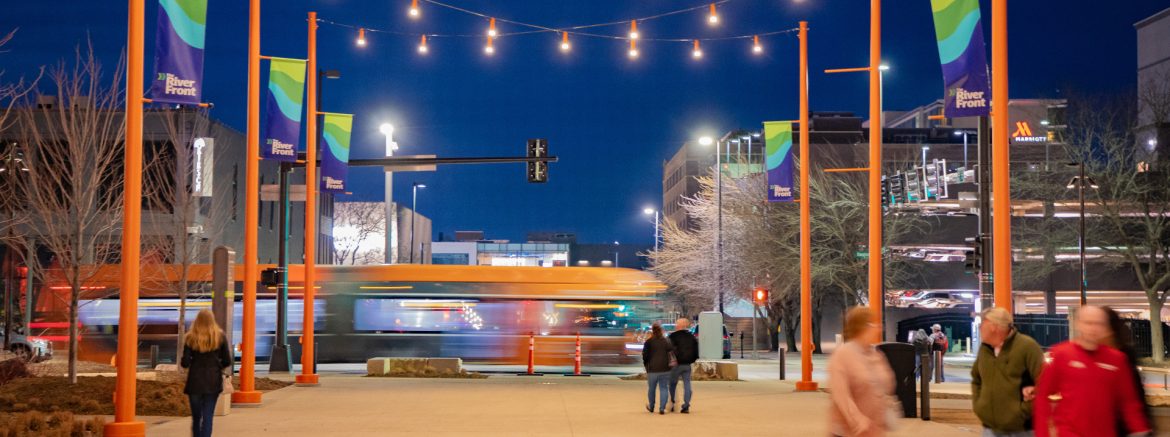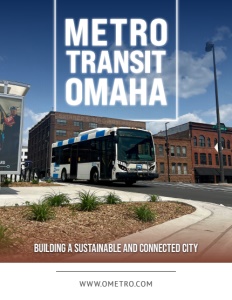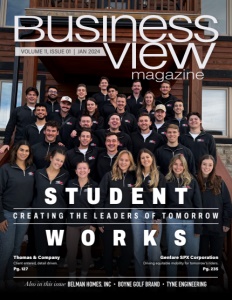Metro Transit Omaha
Building a Sustainable and Connected City
Keeping Omaha moving with a greener vision in mind
Post-COVID, transit numbers are up, and cities across the US are gearing towards new initiatives in an effort to cater to their valued residents. Leading the charge and en route to further success is Metro Transit Omaha. With more than five decades of experience since its inception in 1972, this pivotal transit authority has grown to be much more than a mere transportation provider. It has become an indispensable lifeline for the city, adapting to meet the ever-changing needs of Omaha’s bustling and diverse community.
Lauren Cencic, Chief Executive Officer (CEO) of Metro Transit Omaha is hard at work steering the organization through its continuous evolution. With a keen eye on the past and a vision for the future, Cencic notes, “It’s really about how you are shaping people’s experiences, their lives, and connecting them to opportunities, and it’s a responsibility that we take very seriously.”
Nicole Ebat, Senior Manager of Communications and Community Relations, is complimenting her leadership, bridging Metro with the community to further underline the organization’s commitment to serving and enhancing the city of Omaha.
Route expansion plans
Recent legislative developments have provided the green light to expand operations beyond the city’s borders. This expansion will allow Metro’s services to extend into the surrounding suburban areas and push toward a more inclusive and far-reaching public transit system that aligns with their broader community engagement and service goal.
Metro’s 26 routes primarily serve Omaha’s core while extending its reach to nearby communities, including Council Bluffs, Bellevue, Papillion, La Vista, and Ralston, through contract services. This coverage is supported by the dedicated efforts of nearly 350 employees and a diverse team that forms the means of Metro’s operations.
These professionals, many of whom have long tenures with Metro, are distributed across various roles encompassing drivers, maintenance staff, and administrative personnel, ensuring the smooth functioning of the transit system.
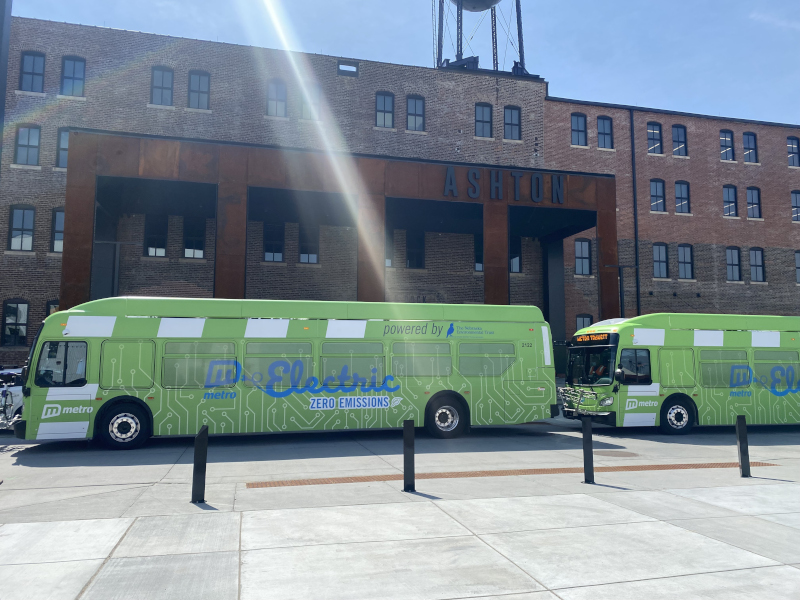
Two of Metro’s bright green electric buses sit outside Millwork Commons in downtown Omaha
A “green” route forward
Metro recently moved toward including electric buses in its fleet as a promise to keep sustainability in mind. Three bright green electric buses make their way around Omaha roads.
With approximately a third of its fleet now consisting of alternative fuels, Metro stands at the forefront of environmental stewardship. Its fleet, a mix of clean diesel, CNG, and electric buses, reflects a commitment to fostering a greener future moving forward.
Although this transition to more sustainable options isn’t just a change in hardware, it involves a comprehensive shift in operations, including the retraining of drivers to utilize electric buses effectively, especially in leveraging regenerative braking systems.
The COVID-19 pandemic posed unforeseen challenges, mirroring the difficulties public transit systems encountered worldwide. Metro showcased remarkable resilience. The tough times aren’t over yet, but the agency is steering through the worst of it with steadily increasing ridership. This October, the agency recorded more than 313,000 rides, which marked the highest month of ridership since before the pandemic. Metro expects to record a more than 10% increase in ridership in 2023 over 2022.
Central to Metro’s overall success has been its commitment to maintaining affordability and accessibility in its transit services, even post-pandemic. While operational costs continue to increase, the decision to keep fares stable for over a decade is a notable feat.
Cencic emphasizes, “A single ride is a dollar and a quarter, which is something that we are very proud of, that we’re able to offer such great service for that price.”
Underlining the organization’s dedication to providing services without imposing the financial burden on its riders, Metro took a new approach to fare management: a monthly fare capping program.
The cost of keeping Omaha moving
Metro offers a monthly pass For $55. It’s a long-standing option that provides savings to frequent riders, but Metro recognized the upfront cost was a barrier for many. Metro leveraged new technology to make these savings more accessible. With an account-based system utilizing smart cards and smartphones, the fare-capping program allows riders to accumulate travel costs incrementally.
As passengers use the service, their fares are tracked, and once they reach the $55 threshold within a month, any further travel is free of charge for the remainder of that month. This system effectively removes the barrier of the initial lump-sum payment, enabling more passengers to enjoy the financial benefits of the monthly pass without the upfront cost.
Ebat also highlights Metro’s strategic focus on transforming public perception and increasing ridership. Their approach centers on redefining public transit as a more desirable and practical alternative to private vehicles. This effort aims to shift the community’s mindset, presenting public transit as a necessity and a preferred choice for day-to-day transportation.
To achieve this, there has been an increase in strategic marketing and community outreach.
“We’re working to make taking the bus accessible but fun and exciting,” Ebat highlights, underlying that public transit is more than just a service—it’s an integral part of the community experience.
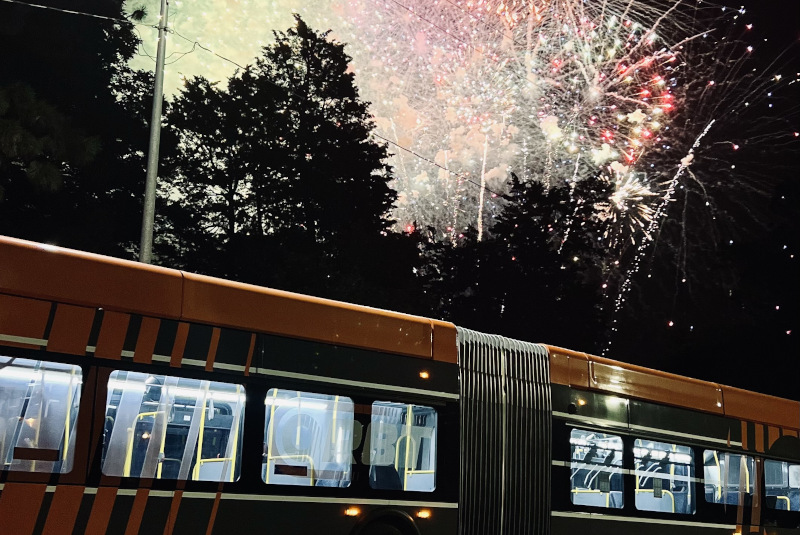
An ORBT sits under a firework show in Midtown Omaha during a Memorial Park concert
A community route in mind
The commitment to community engagement is vividly illustrated in their initiatives, notably the K-12 Rides Free program. In a collaborative effort with Omaha Public Schools, this program provides free bus services to kindergarten through 12th-grade students. Beyond simple transport, this program weaves public transit into young people’s daily lives, influencing long-term insights into public transportation.
The success of this program is evident in its impressive figures: nearly 800,000 rides have been provided to students, with 52,000 rides in the last month alone, showcasing exponential growth. This reach extends into higher education, with pass programs offered to most local universities and colleges. These initiatives facilitate student mobility across all educational levels and firmly integrate public transit as a crucial element of academic life and broader community engagement.
Charting its future route forward, Metro’s strategic vision, outlined in its ‘MetroNext’ plan, is a testament to its ambitious and forward-thinking approach. It plans on expanding its operational footprint, introducing new services, and improving existing ones, catering to the evolving needs of the city’s residents and elevating the overall transit experience by broadening its service offerings to include more time slots, including weekends and evening hours.
This enhancement in service is strategically designed to cater to a broader spectrum of travel needs and schedules, rendering public transit a more convenient and practical option for a larger population segment.
Alongside these service expansions, there is a focus on improving physical infrastructure and passenger amenities. Upgrades to bus shelters are in the pipeline to provide passengers with a more comfortable and secure waiting experience. Implementing real-time arrival information systems is another piece of this plan, offering passengers timely and accurate updates about passenger travel, reducing uncertainty, and making travel planning more efficient.
Metro has embraced innovative strategies to capture the public’s attention and reshape awareness about public transportation. Their marketing efforts are not just about promoting the practical benefits of bus transit, such as saving on gas costs or reducing the stress of driving, but also about making the experience of taking the bus more enjoyable.
“Our efforts go beyond transportation; we’re creating community spaces at our stations, complete with Wi-Fi, real-time information, and art installations, to foster a sense of place and belonging,” Ebat explains. A standout example of creative marketing is the integration of their buses into unexpected city spaces, like parks, particularly with their ORBT service, which the agency recently threw a birthday party for—complete with five-foot-tall birthday day—within Omaha’s newest urban park.
Imagine the surprise and delight of encountering a 60-foot-long, vibrant orange bus in the middle of a park, a place usually off-limits to vehicles. This placement sparks curiosity and encourages interaction with the bus service in a relaxed, leisurely setting.
“We’re focused on bringing our buses into areas where people might not expect them, turning these moments into opportunities for discovery and learning,” says Ebat, expressing pride in her team’s efforts. This approach brings unique visibility and invites residents to explore and experience public transit in a new light, perhaps while enjoying a casual Saturday at the park or near the new downtown roller-skating ribbon.
Metro’s mission extends well beyond the realm of just providing transportation services. It is about creating pathways to opportunities and enriching experiences.
Cencic passionately expresses this philosophy: “We’re in the business of public transit. It’s not about what public transit can do for me, but it’s what it can do for us and everyone as a community.”
By focusing on what public transit can achieve for the collective, Metro reinforces its commitment to fostering a connected, accessible, and sustainable future for all.
AT A GLANCE
Metro Transit Omaha
What: The transit authority serving Omaha with a strong community and sustainable focus
Where: Omaha, Nebraska
Website: https://www.ometro.com/
PREFERRED VENDORS
Master’s Transportation – www.masterstransportation.com
Master’s Transportation® is here to “Move People Forward” as your transportation partner. With over 35 years of experience in the transportation industry, we are committed to providing quality, reliability, and innovation in all that we do. Master’s Transportation® is conveniently located across the nation to best serve you.
Our bus sales, leasing, service, and parts departments are all committed to excellence and dedicated to helping you every step of the way.
From short-term bus rentals to large-scale commercial fleet expansions, our professional team is equipped to offer you a custom transportation solution that is focused on safety, efficiency, and affordability.
Master’s Transportation is a leading provider of lease and lease-to-own commercial vehicles, and our flexible financing options simplify the process for acquiring your new vehicle or fleet.
Let us help move you forward! To view our large selection of inventory or find a location near you, visit our website at MastersTransportation.com
Davis Insurance Agency, Inc.
PO Box 540068
Omaha Nebraska 68154
